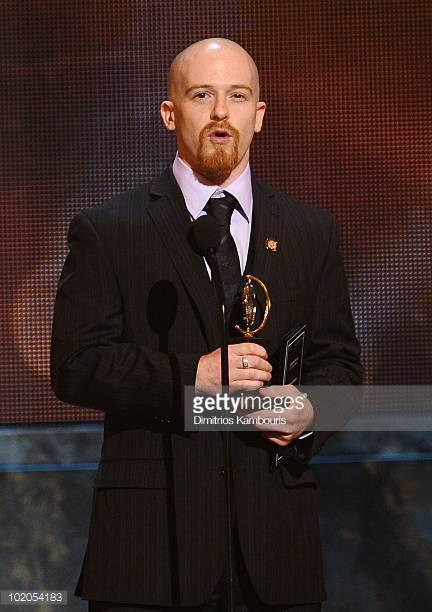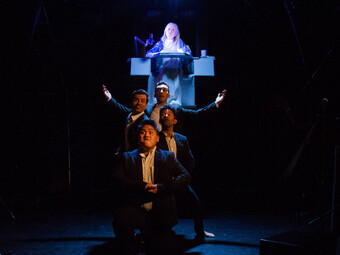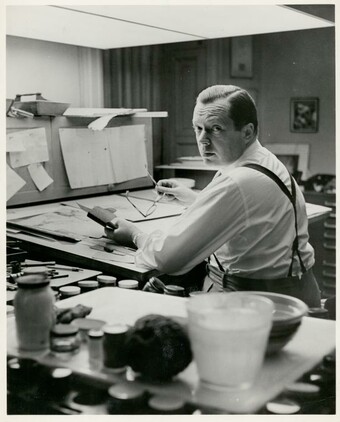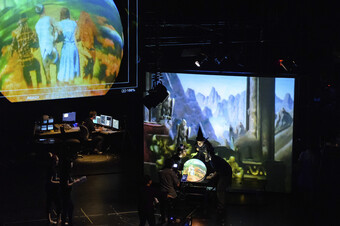Nine Thoughts On Theater Awards
1. My son is six years old, and he has lots of awards. He received a trophy for showing up ten times to his soccer league in the park, an award for completing a season in a small-town daycare, a rubber anklet for learning how to swim, and a diploma for finishing preschool. There are stickers and pencils and bobble-headed erasers all over our house, granted for behaving like a civilized human being in kindergarten.
When I was growing up, I thought that there were only a handful of awards: Olympic medals, the Nobel prize, the Oscar, the Pulitzer, the Newberies and the Caldecotts. You could win the Super Bowl, an NBA championship or, as long as you weren’t the Red Sox, the World Series. And you could win a Tony Award on Broadway.
Times have changed. The meaning of “award” has changed. Awards have devalued themselves through proliferation. But the big ones still matter. When I recently told someone about a conversation I’d had with a Nobel laureate, the point I was making got waylaid by the fact that I knew a scientist of that caliber. The time I went to a party and almost put my drink down next to what I realized was an Oscar, I felt a lot like a schoolboy on his first date. And when theatre people come to my house, they get pretty excited to flick the Tony I keep on a bookshelf next to a sculpture my son made.
2. At seventeen, I moved to New York City to learn how to be a theatre designer. By 1994, I had a degree, a relatively small amount of debt, the lease on a leaky two-bedroom near New York City’s #1 Superfund Site, a doomed starter marriage, and a pretty clear idea that I’d be spending the rest of my life making new plays and experimental theatre. I was a sound designer and composer with only two ambitions (beyond paying back my loans, making great theatre every day, and figuring out how to file divorce papers without a lawyer): to one day incorporate Cap’n N Tennille’s “Muskrat Love” into a show in a dramaturgically sound fashion, and to be honored with an OBIE award for “sustained excellence” before I was forty. I told myself that the lack of a Tony for sound design didn’t hurt my feelings because I was too indie theatre to get there anyhow.
3. In 2007, I was asked to look over a letter some fellow sound designers had crafted. It offered a rubric for evaluating the sound designs created for Broadway plays and musicals. A handful of great producers and general managers, with the support of some very committed collaborating artists, had managed to make their voices heard in the halls of the Tony committee—they were ready to include sound design as one of the arts to be honored annually at the highest level of American commercial theatre. However, these producers were concerned that their nominators and voters wouldn’t be able to evaluate the work, since sound design encompasses a lot of different arts, can be pretty subtle, and a lot of folks don’t quite get what it is we do.
I thought it was brilliant of these advocates—to forestall any objections to the creation of the Tony for sound design by framing it as an art that can be interpreted with knowledge. It suddenly felt as though the leaders of American mainstream theatre were no longer questioning the fact that sound design, for both musicals and plays, was an art, created by artists—they were just nervous about how to evaluate it. And that was really, really nice. It was inclusive. It felt important. It felt like we’d finally been asked to the prom, even though some of us might wear kilts or crazy beards or have tattoos on our necks. Heck, one day, someone without a penis might actually be invited.
4. That same year, I received the OBIE for which I’d set my cap. I have often talked about how it was the single greatest validation of what I do—an award from artists I respect, for a body of work I’d created.
The funny thing about “categoried” theatre awards is that they’re basically comparing mangos to chicken salad sandwiches. It is nearly impossible to rationally compare the music of Hedwig with the music from Bridges of Madison County. That’s why the OBIE was so important to me—no one said my work was “better” than anyone else’s – they just said —“Hey, you did really good work this season. Your art helped bring a whole bunch of shows to a higher level. And we recognize that.”
Theatre awards matter because theatre vanishes.

at the 2010 Tony Awards for his work on Fela! Photo by Getty Images.
Amazingly, the Tony folks have come up with a method for electing a winner. They do it in lots of categories that are hard to even comprehend—lighting and orchestrations, directing and producing. Tony voters found a way to compare Tovah Feldshuh’s embodiment of Yentl to Irene Worth’s Princess Kosmonopolis, Lynn Redgrave’s Mrs. Warren, and Rosemary Harris’s Julie Cavendish. They compared Sweeney Todd to The Best Little Whorehouse in Texas, Ballroom, and They’re Playing Our Song. They picked a “best” in every case, and they acknowledged it. And I’ll admit that it felt really sweet in 2010, when the picked my sound design for Fela!
5. Theatre awards matter because theatre vanishes. Paintings, sculptures, novels, and poems can last for centuries, or millennia. And, while scripts live on, productions themselves last only as long as that magical assemblage of actors, stagehands, musicians, stage managers, craftspeople and front-of-house staff are together. They enact the staging of one particular director, the movement of one specific choreographer, those particular words said or sung in that exact environment created by those exact designers, and (in musicals) conducted by that specific conductor. It exists only as long as that group gives it life. Sometimes, you get a nice long run—a series of very subtle variations on the same theme. But, once it’s gone, it’s gone. Forever. Theatre awards are like beautiful little gravestones—a marker for something that mattered, something you can sit beside and remember.
6. In Philadelphia, they give out a Barrymore Award. In Chicago, it’s the Jeff. DC has the Hayes; LA, the Ovations; Paris, the Molière; and London, the Olivier. New York has a number of others in addition to the Tony—the Lortel, the Drama Desk, the OBIE, and the Audelco. They all recognize excellence in sound design, or they all did, until a few days ago, when the Tony committee changed their mind.
7. In the 2012–13 season, the Barrymore Awards disappeared from Philadelphia, because the Philadelphia Theatre Alliance was deemed irrelevant by its own board. A bunch of theatre artists and administrators got together in a town hall to discuss the loss of this organization. There was a whole lot of “yim-yam” about what the city’s theatres needed. Writers wanted support for new plays. Actors wanted a centralized location for casting directors. Designers wanted drawings for all of the venues. Directors wanted founding artistic directors to hire someone other than themselves. And one really amazing woman wanted to organize health insurance for freelance artists.
What did everyone want? The Barrymores to come back. We didn’t all agree on their format, the way they should be administered, or even how to make them happen. But a dedicated team got together and founded Theater Philadelphia, whose primary purpose is to administer the Barrymore awards. Because theatremakers have a fundamental need to be recognized as artists.
8. My Tony Award has not granted me any special powers. It has had no effect on my fees (so that can’t be why producers would want to abolish it.) It came with no cash award, and, if I want to hock it, I must first offer it to the American Theater Wing for $25.
It was an award for the way I reimagined how a sound system could convey an idea, for breaking down barriers between actors and audience, and for a complicated balancing act between the super distinct sound of Afrobeat and the ears of Broadway audiences.
It has, however, opened doors. It helps projects on which I am a core creative artist get funding. I was hired by Princeton within four months of that ceremony at Radio City Music Hall. It comes with a presumption of my competence when I walk into a new collaboration. It has professional value.
But, more than that—it was an honor that resonated throughout my team, and reflected back on the entire company of Fela! It was an award for the way I reimagined how a sound system could convey an idea, for breaking down barriers between actors and audience, and for a complicated balancing act between the super distinct sound of Afrobeat and the ears of Broadway audiences. It was an acknowledgment of thousands of hours of work with a demanding and visionary director, and a celebration of my artistry.
This year, around twenty new sound designs will be heard on Broadway. I sure hope their creators get a chance to be acknowledged.
9. My son’s plastic soccer trophy broke the day he brought it home. But he treasures the rubber anklet he earned by spending three years facing down his fear of drowning, and learning how to fly in the water.









Comments
The article is just the start of the conversation—we want to know what you think about this subject, too! HowlRound is a space for knowledge-sharing, and we welcome spirited, thoughtful, and on-topic dialogue. Find our full comments policy here
We are so proud to recognize some of the
amazing Sound Designers who help make our productions that much more
interesting, meaningful and moving. We can't wait to do it again in
September!
https://www.facebook.com/ph...
This is a very intelligent POV and it changed my mind on theater awards. I have a punk rock attitude to all entertainment awards. They remind me of the school day achievements of those that pleased authority. I never considered the value in the ritual was that of a binding agent to cohere an often fractured community. This is a good read.
Thank you for taking the time to craft such a lovely, well written and informative piece. As a playwright and director I certainly appreciate the creative value of sound design, as it can deepen and elevate a production to whole new levels. It certainly deserves to be recognized and honored.
Rob, thanks. Not only do you make great sound, you sound great. Well written, sir!
Rob, I certainly appreciate your thoughts on this subject, and also subscribe to many of the points you present for us to consider. The explanation of who the designer is and how they fit into the team effort of bringing an artistic vision to LIFE is clearly stated, along with the value of their contribution to the end product. Mostly, I'm happy to read and align myself with your views on the fleeting nature of the presence and longevity of any particular show. I've always tried to keep in mind, while designing or, especially mixing, that just this once, this very performance, this short time shared with a single group of friends in the audience, is very special and a unique experience for each and every person, similar but individually affecting those folks. I also believe that the creation of that single event, once complete, is 'sent out' into the world as a personally crafted artistic expression that is given a valued life and place in theater history, a memento, if you will, of that one special moment when all the members of a company came together for the sole purpose of making a creative endeavor a successful entertainment 'piece' appreciated and enjoyed by those present. As for sound as a creative process, I am a very firm believer and staunch supporter of the view that the sound is ever and always a 'fluid' craft, being as the mixer is (or at least, SHOULD be!) attuned to and in virtual contact through the faders, with EVERY performer involved, following them and 'performing' the mix, as a kind of a supporting role in the show's delivery,
enhancing the intent and impact, expanding the 'character' of the story. The design of the way the sound is to be created and delivered among those attending is a many faceted effort, technical, musical, subjective while specific, interpretive and intuitive, made in concert with directors and other design teams. To think that 'they', who are supposed to be aware and educated in what makes a performance or show event good, special, worthy of note, or even awarded for the accomplishment of the goal of 'fine performance', will not be taking note and excluding sound from among the recognized 'creative design' functions is simply outrageous and insulting. I thank you, John, and so many others for your efforts and outcries to the Tony folks, and bringing the theatrical community at large together in such a resounding fashion, rallying the troops, as it were. We will be heard, even if it's not through a professionally designed system! Take care, and...CHEERS!